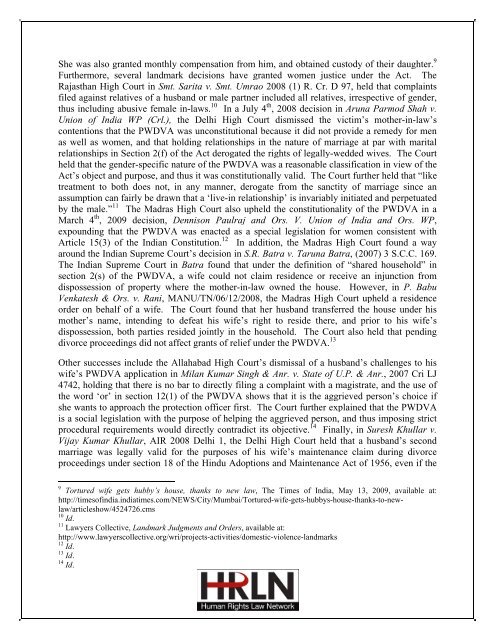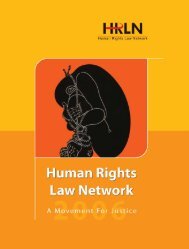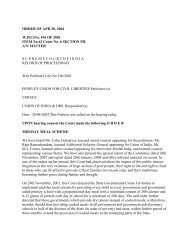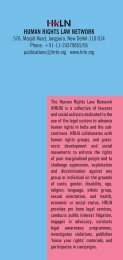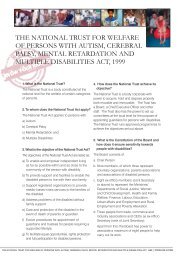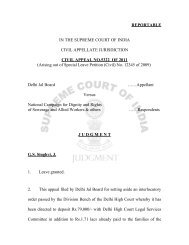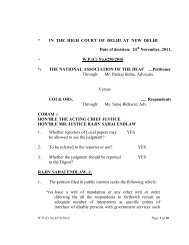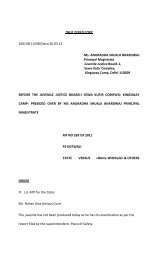The Protection of Women From Domestic Violence Act: The Current ...
The Protection of Women From Domestic Violence Act: The Current ...
The Protection of Women From Domestic Violence Act: The Current ...
- No tags were found...
You also want an ePaper? Increase the reach of your titles
YUMPU automatically turns print PDFs into web optimized ePapers that Google loves.
She was also granted monthly compensation from him, and obtained custody <strong>of</strong> their daughter. 9Furthermore, several landmark decisions have granted women justice under the <strong>Act</strong>. <strong>The</strong>Rajasthan High Court in Smt. Sarita v. Smt. Umrao 2008 (1) R. Cr. D 97, held that complaintsfiled against relatives <strong>of</strong> a husband or male partner included all relatives, irrespective <strong>of</strong> gender,thus including abusive female in-laws. 10 In a July 4 th , 2008 decision in Aruna Parmod Shah v.Union <strong>of</strong> India WP (Crl.), the Delhi High Court dismissed the victim’s mother-in-law’scontentions that the PWDVA was unconstitutional because it did not provide a remedy for menas well as women, and that holding relationships in the nature <strong>of</strong> marriage at par with maritalrelationships in Section 2(f) <strong>of</strong> the <strong>Act</strong> derogated the rights <strong>of</strong> legally-wedded wives. <strong>The</strong> Courtheld that the gender-specific nature <strong>of</strong> the PWDVA was a reasonable classification in view <strong>of</strong> the<strong>Act</strong>’s object and purpose, and thus it was constitutionally valid. <strong>The</strong> Court further held that “liketreatment to both does not, in any manner, derogate from the sanctity <strong>of</strong> marriage since anassumption can fairly be drawn that a ‘live-in relationship’ is invariably initiated and perpetuatedby the male.” 11 <strong>The</strong> Madras High Court also upheld the constitutionality <strong>of</strong> the PWDVA in aMarch 4 th , 2009 decision, Dennison Paulraj and Ors. V. Union <strong>of</strong> India and Ors. WP,expounding that the PWDVA was enacted as a special legislation for women consistent withArticle 15(3) <strong>of</strong> the Indian Constitution. 12 In addition, the Madras High Court found a wayaround the Indian Supreme Court’s decision in S.R. Batra v. Taruna Batra, (2007) 3 S.C.C. 169.<strong>The</strong> Indian Supreme Court in Batra found that under the definition <strong>of</strong> “shared household” insection 2(s) <strong>of</strong> the PWDVA, a wife could not claim residence or receive an injunction fromdispossession <strong>of</strong> property where the mother-in-law owned the house. However, in P. BabuVenkatesh & Ors. v. Rani, MANU/TN/06/12/2008, the Madras High Court upheld a residenceorder on behalf <strong>of</strong> a wife. <strong>The</strong> Court found that her husband transferred the house under hismother’s name, intending to defeat his wife’s right to reside there, and prior to his wife’sdispossession, both parties resided jointly in the household. <strong>The</strong> Court also held that pendingdivorce proceedings did not affect grants <strong>of</strong> relief under the PWDVA. 13Other successes include the Allahabad High Court’s dismissal <strong>of</strong> a husband’s challenges to hiswife’s PWDVA application in Milan Kumar Singh & Anr. v. State <strong>of</strong> U.P. & Anr., 2007 Cri LJ4742, holding that there is no bar to directly filing a complaint with a magistrate, and the use <strong>of</strong>the word ‘or’ in section 12(1) <strong>of</strong> the PWDVA shows that it is the aggrieved person’s choice ifshe wants to approach the protection <strong>of</strong>ficer first. <strong>The</strong> Court further explained that the PWDVAis a social legislation with the purpose <strong>of</strong> helping the aggrieved person, and thus imposing strictprocedural requirements would directly contradict its objective. 14 Finally, in Suresh Khullar v.Vijay Kumar Khullar, AIR 2008 Delhi 1, the Delhi High Court held that a husband’s secondmarriage was legally valid for the purposes <strong>of</strong> his wife’s maintenance claim during divorceproceedings under section 18 <strong>of</strong> the Hindu Adoptions and Maintenance <strong>Act</strong> <strong>of</strong> 1956, even if the9 Tortured wife gets hubby’s house, thanks to new law, <strong>The</strong> Times <strong>of</strong> India, May 13, 2009, available at:http://times<strong>of</strong>india.indiatimes.com/NEWS/City/Mumbai/Tortured-wife-gets-hubbys-house-thanks-to-newlaw/articleshow/4524726.cms10 Id.11 Lawyers Collective, Landmark Judgments and Orders, available at:http://www.lawyerscollective.org/wri/projects-activities/domestic-violence-landmarks12 Id.13 Id.14 Id.


